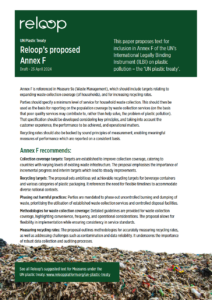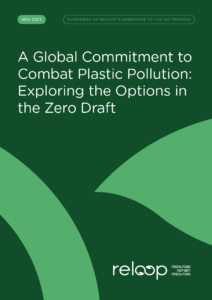UN Plastic Treaty Recommendation
Waste Management
Minimum requirements for a shared framework to deliver best-in-class waste management.
Reloop’s proposed text on waste management outlines a comprehensive framework for Parties to effectively manage plastic waste throughout its life cycle, from collection to final disposal.
It also emphasises the shared responsibility of Parties to address this global challenge through effective regulation, cooperation, and resource allocation.
Key provisions
- Establishment of waste management systems: Each Party is required to adopt effective measures, including sector-by-sector or cross-sector approaches where necessary, to manage plastic waste safely. This includes handling, collection, sorting, transportation, recycling, treatment, and final disposal, with priority given to prevention, reuse and recycling. Parties are encouraged to integrate plastic waste management into broader waste management strategies, considering the special circumstances of small island developing States.
- Regulation of waste management practices: Parties are encouraged to regulate waste management practices to control emissions of harmful substances, including microplastics. Facilities handling or managing plastic waste must prevent the escape of macro- and micro-plastics, and emissions of key pollutants must meet minimum standards.
- Waste minimisation: Parties must take actions to minimise the generation of plastic waste, consistent with the waste hierarchy and the objectives of the treaty. These actions should be outlined in national plans.
- Meeting specific requirements: Parties are required to meet specific targets for collection coverage, recycling rates, and phasing out illegal dumping and open burning, as detailed in Annex F.
- Monitoring and reporting: Methodologies for calculating and reporting on collection rates and recycling targets are provided in Annex F. Parties must reflect their implementation measures in national plans, and cooperation on an international or regional level is encouraged.
- Resource allocation: Parties must ensure the availability of funds and resources for waste management activities, including technical assistance, institutional reform, and infrastructure development. Efficient use of funds from Extended Producer Responsibility (EPR) schemes is emphasised to support waste management initiatives.
- Guidance and guidelines: Parties are urged to consider guidance and guidelines from other international agreements, such as the Basel Convention and the London Convention, in implementing waste management measures.
UN Plastic Treaty text amendments
Reloop proposes changes to clause 9a Waste Management – Minimum Requirements.
Proposed annex to the treaty text
-

Reloop’s proposed Annex F
This paper proposes text for inclusion in Annex F of the UN’s International Legally Binding Instrument (ILBI) on plastic pollution
More on waste management
-

Reloop discusses INC’s Zero Draft
16 minute video discussing the key elements of this summary paper.
-

A Global Commitment to Combat Plastic Pollution: Exploring the Options in the Zero Draft
Summary analysis of the options for a global commitment to combat plastic pollution.